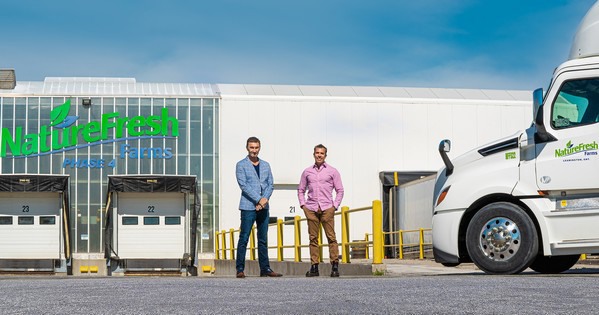Nature Fresh Farms joins the University of Windsor in its long-haul vehicle transportation sustainability project to help achieve advancements in energy efficient shipping.
The purpose of this $160,000 project is to determine the impact of long-haul electric vehicles (LHEV) on Ontario’s electric grid. They will create an archetypal routing network by determining the most frequently traveled routes and then overlay the electric grid which will help determine how it will perform when managing a fleet of electric trucks. Being battery operated the trucks will look, haul and perform similarly to diesel trucks, but with zero emissions. By drawing power from the electric grid, the trucks would be able to sustainably deliver goods and allow transferring of electrons back to the grid at strategic locations and times.
The project is spearheaded by Dr. Rupp Carriveau of the Environmental Energy Institute, and his associate Dr. Hanna Maoh of the Cross Border Institute, with the assistance of several graduate students. In addition, they are developing industry related partnerships that will assist in different facets of the project, including with Nature Fresh Farms.
 Left to right: Peter Quiring, Dr. Rupp Carriveau
Left to right: Peter Quiring, Dr. Rupp Carriveau
“We needed a partner to help pilot our project and potentially test it and Nature Fresh Farms came to mind. They are a very progressive company and are calculated risk takers that push boundaries with new technologies,” said Carriveau.
The analytics and case studies are where Nature Fresh Farms comes in. The company will be able to send information from its operations which will include shipping schedules, power use and utility costs to provide the research team with data that will determine the strengths and weaknesses of converting its fleet to electric vehicles. This information will help examine the opportunities of electric trucks in the greenhouse industry.
“As a company we are always thinking ‘what is next?’, whether it’s developments in product varieties, technology or sustainability. Green transportation is the next big focus,” said Peter Quiring, Nature Fresh Farms CEO. “We were given the opportunity to work closely on this project and offer our operations as a case study to see how we can find feasible alternatives, not only for Nature Fresh Farms or even for companies in agriculture, but for every industry relying on the transportation of their goods.”
With the first step of the project working towards establishing an electrical grid that will manage a fleet of electric vehicles, phase two is the potential pilot study of developing and using electric long-haul vehicles for that grid. Nature Fresh Farms looks forward to the continued partnership and progression of the project with the University of Windsor and the future in the sustainable shipping of goods.
 For more information:
For more information:
Nature Fresh Farms
Tel: +1 (519) 326-1111
info@naturefresh.ca
www.naturefresh.ca
